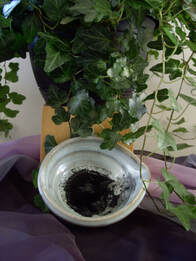 Cleanse out the old leaven that you may be a new lump, as you really are unleavened. For Christ, our paschal lamb, has been sacrificed. Let us, therefore, celebrate the festival, not with the old leaven, the leaven of malice and evil, but with the unleavened bread of sincerity and truth. -1 Corinthians 5: 7-8 Ash Wednesday has no holiday greeting. “Happy Ash Wednesday” sounds like a contradiction (since the word “happy” has traveled so far from its original meaning, “blessed” or “fortunate.” Instead, we recognize observance by the odd sign of ash smeared faces. An uptick in the number of people seeking imposition of ashes in parks and sidewalks (outside church enclosed worship) shows how important this non-verbal sign remains. We share a human need to pause and remember our humanity. Ash Wednesday is the entrance swinging open to Lent. Another trend in Lenten practice is to take on a new practice instead of fasting. To slow down, become more mindful, care for our bodies better, demonstrate purposeful compassion. These are all good practices. And the way we tend to them determines whether Lent becomes primarily a season of self-improvement or a season of shedding the sin that accrues to our everyday existence. But have you noticed how we seem to now talk more about self-improvement than the impact of evil? Maybe it’s the empowering knowledge that we can improve ourselves contrasted with the overwhelming challenge of confronting evil. That can only be done with God’s intervention. It means admitting our own vulnerability and incapacity to do it by our own ash-marked selves. “When we participate in the service of ashes, we confront our sin. We recognize our inability to live up to all God has created us to be, and our need to be forgiven…. On the first day of Lent, we come before God recognizing our humanity and repenting of our sin.” (Why Ashes? UMC.org) In the early days of Methodism, every circuit rider’s saddlebag held a copy of John Wesley’s “Primitive Physick,” written in 1791. This was Wesley’ best attempt to grapple with healing the effects of sin in our physical bodies. These are the opening words (in their original spelling when f=s except at the end of a word, and “man” was used for humankind). When man came firth out of the hands of the great Creator, clothed in body as well as in foul, with immortality and incorruption, there was no place for phyfic, or the art of healing. As he knew no fin, fo he knew no pain, no ficknefs, weaknefs, or bodily disorder.…The entire creation was a peace with man, fo long as man was at peace with his Creator. So that will might “the morning ftars fing together, and all the fons of God fhout for joy.” But fince man rebelled againft the Sovereign of heaven and earth, how entirely is the fcene changed! The incorruptible frame hath put on mortality. The feeds of weaknefs and pain, of ficknefs and death, are now lodged in our inmoft fubftance; whence a thousand diforders continually fpring….the earth exhales poifonous damps from beneath; the beafts of the field, the birds of the air, the fifhes of the fea, are in a flate of hoftility; the air itfelf that furrounds u son every fide, is replete with the fhats of death; yea, the food we eat, daily faps the foundation of the life which cannot be fuftained without it. So has the Lord of all fecurred the executin of his decree, ----Duft thou art, and unto duft thou fhalt return. Wesley goes on to prescribe exercise, temperance in food (“8 ounces of animal protein and 12 of vegetables in 24 hours is sufficient”)and drink (water if tolerable and, if not, small beer) and going to bed early. When these preventatives were not enough, the “Primitive Physick” prescribed remedies he’d seen people try, such as for a cold in the head, “Pare very thin the yellow rind of an orange. Roll it up infide out, and trhuft a roll into each nostril.” These attempts at healing were an attempt to undo sin’s consequences. Additionally, Wesley spoke out against “abuse of animals, the exploitation of poor people, and the treatment of human beings as chattel.” His early focus on social justice led to the Social Principles, a living document that describes how we follow Jesus Christ in “accepting the freedom and power God gives you to resist evil, injustice, and oppression in whatever forms they present themselves.” (baptism covenant). In 1908, The Methodist Episcopal Church, one of our predecessors, was the first denomination to adopt a Social Creed, which called for “equal rights and complete justice for all men in all stations of life.” The new 2020 Social Principles state our specific commitments, as United Methodists, to restore damage done and to shape communities whose norms stand up against evil’s insidious force. My friends, as we enter Lent this year, there is nothing wrong with fasting from something we love to experience longing that reminds us to turn to God. Fasting is a practice that reveals what controls us, writes, Richard Foster. So, give up your chocolate, or TV, or complaining if it turns you toward Jesus. But don’t settle for self-improvement. Let your encounter with the living Christ burn away signs of sin in your life. Let it cleanse you to be a sign of, and partner in, God’s healing of humanity and all creation. May lent 2020 be a space for grace within you and in the space you share with others. allow the lumps to become leaven! In God’s Grace, Karen Ash Wednesday is a particular time for new beginnings in faith, a time for returning to the Lord. On tis day we recall our mortality and wait upon the LORD for a renewing Spirit. This is a time for putting aside the sins and failures of the past in the light of who we are yet to become by the grace of God. -Larry Stookey, The New Handbook of the Christian Year, 1992, page 106.
1 Comment
 “You have heard that it was said, ‘You shall love your neighbor and hate your enemy.’ But I say to you, love your enemies and pray for those who persecute you, (Mt 5: 43-44 NRSV) I can’t remember the last time that words from scripture made headline news. This creates a wonderful opportunity to talk with other people about what this passage means to us and to them. I appreciate the honesty of people who name that it’s hard to follow Jesus’ instructions on this one. Truthfully, it’s hard to live into alot of the Sermon on the Mount, where these words are recorded. So, as people are talking about this year’s National Prayer breakfast, why not widen the conversation by asking them, and each other, how these words impact our own lives? What’s the word, idea, or situation that trips you up? How do these words empower us for a different way of being in the world? Do we respond by rejecting Jesus’ teaching as impossibly aspirational? Or by allowing God to turn us inside out and right side up? Jesus’ instruction to “love your enemy” comes at the end of Mathew chapter 5. The words immediately before are: Give to everyone who begs from you, and do not refuse anyone who wants to borrow from you. (Mt 5: 42 NRSV) (See, the teachings are not getting any easier!) And right after “love your enemy” we read,….so that you may be children of your Father in heaven; for he makes his sun rise on the evil and on the good, and sends rain on the righteous and on the unrighteous. For if you love those who love you, what reward do you have? Do not even the tax collectors do the same? And if you greet only your brothers and sisters, what more are you doing than others? Do not even the Gentiles do the same? Be perfect, therefore, as your heavenly Father is perfect. (Mt 5: 45-48 NRSV) What’s the word, idea, or situation that trips you up? Personally, I really have trouble with the word “enemy.” I realize that’s partly due to my privileged status in the world and partly due to my childhood role models of bridging differences and cultivating compassion. So I need to think about what "enemy" means, and about what "love." Who do I find it difficult to behave lovingly toward? Jesus' words indicate that it more important to overcome the aversion than to figure out why I find that person hard to "love." How do these words empower us for a different way of being in the world? The first metaphor in the Sermon on the Mount is salt. When Jesus asks us to be salty people, he doesn’t mean provocative language. I encourage you to do things this week. First, instead of adding fuel to the fire around “love your enemies” as a political situation, treat it as a conversation opportunity. Second, read all of Matthew 5. How do we wrestle with the difficult teachings we find there? What questions are raised that may help us go deeper into Jesus’ teaching? Who might it be helpful for you to talk with about your own questions and struggles? When we name that something is hard, we come to a fork in the road. We can either brush it off as impossible or irrelevant. OR we can wrestle with the difficulty with what it really means to follow Jesus. That’s what moves us from “you’ve heard it said,” (did you hear what so and so said) to a transformative way of loving and living. In God’s Grace, Karen |
Karen L MunsonA pastor and artist, I'm wondering while I'm wandering through God's marvelous creation. Archives
March 2020
Categories |
 RSS Feed
RSS Feed